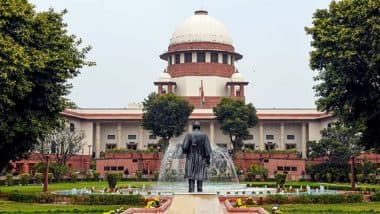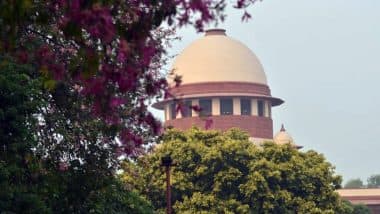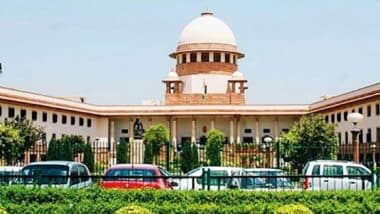New Delhi, August 1: In a landmark judgement, the Supreme Court on Thursday ruled that states have the power to sub-classify Scheduled Castes and Scheduled Tribes (SCs and STs) and said that the authority concerned, while deciding if the class is adequately represented, must calculate adequacy based on effective and not quantitative representation.
The Supreme Court ruled by a majority judgement of 6:1 that sub-classification within the Scheduled Caste and Scheduled Tribes (SCs and STs) reservation is permissible. As many as six separate opinions were delivered in the case. Supreme Court Allows Sub-Classification of SC, ST for Reservation in Majority Verdict.
The judgement was delivered by the seven-judge bench led by Chief Justice of India DY Chandrachud, which overruled earlier judgement in the EV Chinnaiah matter, which had held that sub-classification was not permissible because SC/STs form homogenous classes. Besides CJI Chandrachud, other judges on the bench were Justices BR Gavai, Vikram Nath, Bela M Trivedi, Pankaj Mithal, Manoj Misra, and Satish Chandra Sharma.
Justice Bela M. Trivedi, in a dissenting opinion, said that she disagreed with the majority judgement that sub-classification within the Scheduled Caste and Scheduled Tribes is permissible. "The state for a valid exercise of power to sub-classify under Article 16(4), is required to collect quantifiable data with respect to the inadequacy of representation of the sub-categories in the services of the State. As held in the preceding section, the inadequacy of representation is an indicator of backwardness, and thus, using the cadre as a unit to determine representation alters the purpose of the indicator itself. The state, while deciding if the class is adequately represented, must calculate adequacy based on effective and not quantitative representation," CJI Chandrachud said. Quota Within Quota: States Empowered To Make Sub-Classification in SCs, STs for Quotas Inside Reserved Category, Says Supreme Court.
In a judgement written by Chief Justice Chandrachud and Manoj Misra, they opined that Article 14 of the Constitution permits sub-classification of a class that is not similarly situated for the purpose of the law.
"The Constitution does not bar the allocation of a percentage of seats to a caste since every caste is a class. However, the state must have sufficient material to prove inter-se backwardness between each of the castes. The state must, with the submission of cogent material, prove that there is a rationale principle that distinguishes the groups included and those excluded from the class," CJI said.
"However, the rational principle will have a nexus with the object only when the principle can identify the inter-se social backwardness of the class. For example, if the state allocates a separate percentage of seats for the dhobi caste and the barber caste, it must prove that these two castes suffer from differing levels of social backwardness. It is not merely sufficient for the State to base the classification on the difference in the traditional occupation of the two castes. Rather, the state must, on the basis of quantifiable data, prove that the castes suffer from different levels of social backwardness. The state must also support this with the submission of data on effective representation of the caste in the services of the state," the CJI added.
"Though sub-categorization based on each caste is permissible, we are of the opinion that there can never be a situation where seats are allocated for every caste separately. Though each caste is a separate unit, the social backwardness suffered by each of them is not substantially distinguishable enough to warrant the state reserving seats for each caste. If the social backwardness of two or more classes is comparable, they must be grouped together for the purposes of reservation," CJI said.
"Article 14 of the Constitution permits sub-classification of a class that is not similarly situated for the purpose of the law. The Court, while testing the validity of sub-classification, must determine if the class is a homogenous integrated class for fulfilling the objective of the sub-classification. If the class is not integrated for the purpose, the class can be further classified upon the fulfilment of the two-prong intelligible differentia standard," CJI Chandrachud said.
"In Indra Sawhney (supra), this Court did not limit the application of sub-classification only to the Other Backward Class. This Court upheld the application of the principle to beneficiary classes under Articles 15(4) and 16(4)," he added.
"Article 341(1) does not create deeming fiction. The phrase "deemed" is used in the provision to mean that the castes or groups notified by the President shall be "regarded as" the Scheduled Castes. Even if it is accepted that the deeming fiction is used for the creation of a constitutional identity, the only logical consequence that flows from it is that castes included in the list will receive the benefits that the Constitution provides to the Scheduled Castes. The operation of the provision does not create an integrated homogenous class," CJI Chandrachud said.
"Sub-classification within the Scheduled Castes does not violate Article 341(2) because the castes are not per se included in or excluded from the List," he added. "Sub-classification would violate the provision only when either preference or exclusive benefit is provided to certain castes or groups of the Scheduled Castes over all the seats reserved for the class," CJI Chandrachud said.
"Historical and empirical evidence demonstrates that the Scheduled Castes are a socially heterogenous class. Thus, the state, in exercise of the power under Articles 15 (4) and 16 (4), can further classify the Scheduled Castes if (a) there is a rational principle for differentiation; and (b) the rational principle has a nexus with the purpose of sub-classification," he added.
The CJI, while overruling the Chinnaiah judgement that sub-classification of the Scheduled Castes is impermissible, also mentioned the scope of sub-classification of the Scheduled Castes, which is that the objective of any form of affirmative action, including sub-classification, is to provide substantive equality of opportunity for the backward classes.
"The state can sub-classify, inter alia, based on inadequate representation of certain castes. However, the State must establish that the inadequacy of representation of a caste/groupbecause of its backwardness," the CJI said. "The state must collect data on the inadequacy of representation in the 'services of the state' because it is used as an indicator of backwardness; and Article 335 of the Constitution is not a limitation on the exercise of power under Articles 16(1) and 16(4). Rather, it is a restatement of the necessity of considering the claims of the Scheduled Castes and the Scheduled Tribes in public services.
The efficiency of administration must be viewed in a manner that promotes inclusion and equality as required by Article 16(1)," CJI said. Justice BR Gavai, who suggests identifying the creamy layer in SC/STs category, also holds that E.V. Chinnaiah's judgement, which held that sub-classification amongst the Scheduled Castes for the purpose of giving more beneficial treatment to a group in the larger group of the Scheduled Castes is not permissible, does not lay down a good law.
"That sub-classification amongst the Scheduled Castes for giving more beneficial treatment is permissible in law. To do so, the state will have to justify that the group for which more beneficial treatment is provided is inadequately represented as compared to the other castes in the said list," Justice Gavai said.
Justice Gavai said that while doing so, the state will have to justify the same on the basis of empirical data that a sub-class in whose favour such more beneficial treatment is provided is not adequately represented. He also said that while providing for sub-classification, the state would not be entitled to reserve 100 per cent of the seats available for Scheduled Castes in favour of a sub-class to the exclusion of other castes in the list.
Gavai said that such a sub-classification would be permissible only if there is a reservation for a sub-class as well as the larger class. He also said that the finding of M. Nagaraj, Jarnail Singh and Davinder Singh to the effect that the creamy layer principle is also applicable to Scheduled Castes and Scheduled Tribes lays down the correct position of the law, that the criteria for exclusion of the creamy layer from the Scheduled Castes and Scheduled Tribes for the purpose of affirmative action could be different from the criteria as applicable to the Other Backward Classes, Justice Gavai said.
Justice Vikram Nath also agreed with the conclusion arrived at in the opinions of the Chief Justice and Brother Justice Gavai and added further, any exercise involving sub-classification by the State must be supported by empirical data. He also agreed with the opinion of Brother Justice Gavai over 'creamy layer' in these reserved categories.
Dissenting with the majority judgement, Justice Bela M. Trivedi opined that the law laid down by the Five-Judge Bench in E.V. Chinnaiah is the correct law and deserves to be confirmed. "The etymological and evolutionary history and the background of the nomenclature "Scheduled Castes," coupled with the Presidential orders published under Article 341 of the Constitution, make the "Scheduled Castes", a homogenous class, that cannot be tinkered with by the States," Justice Trivedi said.
"The states have no legislative competence to enact the law for providing reservation or giving preferential treatment to a particular caste/castes by dividing/sub-dividing/sub-classifying or regrouping the castes, races or tribes enumerated as the "Scheduled Castes" in the notification under Article 341," Justice Trivedi said.
"Under the guise of providing reservations or under the pretext of taking affirmative action for the weakest of the weakest sections of society, the state cannot vary the presidential list nor can it tinker with Article 341 of the Constitution," he added.
"The power conferred upon the Supreme Court under Article 142 cannot be used to supplant the substantive law applicable to the case under consideration. Even with the width of its amplitude, Article 142 cannot be used to build a new edifice where none existed earlier, by ignoring express statutory provisions dealing with the subject and thereby to achieve something indirectly, which cannot be achieved directly. The action of the State, though well intentioned and affirmative in nature, if it violates the specific provision of the Constitution, cannot be validated by the Supreme Court in exercise of its jurisdiction under Article 142," Trivedi said.
Agreeing with the Chief Justice, Justice Pankaj Mithal said that the policy of reservation as enshrined under the Constitution and by its various amendments requires a fresh look and the evolution of other methods for helping and uplifting the depressed class, the downtrodden or persons belonging to SC/ST/OBC communities.
"So long as no new method is evolved or adopted, the system of reservation as prevailing may continue to occupy the field with the power to permit sub-classification of a class, particularly a scheduled caste as I would not be suggesting dismantling of an existing building without erecting a new one in its place, which may prove to be more useful," Justice Mithal said. Justice Mithal also supported the opinion of Justice Gavai over the creamy layer identification of SCs and STs.
Justice Satish Chandra Sharma also expressed agreement with the CJI and said, I am fully in agreement with both opinions to the extent that the validity of sub-classification within Scheduled Castes has been held to be constitutionally permissible." "Moreover, I am fully in agreement with the opinion(s) to the extent that any exercise involving sub-classification by the state, must be supported by empirical data that ought to underscore the more 'disadvantaged' status of the sub-group to which such preferential treatment is sought to be provided vis-a-vis the Constitutional Class as a whole," Justice SC Sharma said.
The top court was dealing with the issue of whether sub-classification of the Scheduled Castes for reservation is constitutionally permissible. The Supreme Court was dealing with the constitutional validity of Section 4(5) of the Punjab Act, which depends upon whether any such classification can be made within the class of Scheduled Castes or Scheduled Tribes or whether they are to be treated as a homogenous class.
The Punjab Government had stipulated that fifty per cent of the vacancies of the quota reserved for Scheduled Castes in direct recruitment shall be offered to Balmikis and Mazhabi Sikhs, subject to their availability, by providing first preference from amongst the Scheduled Caste candidates.
On March 29, 2010, the Punjab and Haryana High Court struck down the provisions, relying on the decision in E.V. Chinnaiah. The appeal was filed in the top court against the High Court judgement. In August 2020, the top five judge benches referred the matter to a larger bench.
(This is an unedited and auto-generated story from Syndicated News feed, LatestLY Staff may not have modified or edited the content body)













 Quickly
Quickly


















